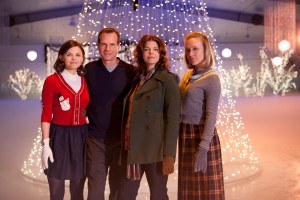
HBO
Spoilers for last night’s Big Love coming up:
The first two episodes of Big Love this season were a pretty grim affair, as the repercussions of problems and bad decisions from last season walloped the Henricksons repeatedly. “Certain Poor Shepherds” was—well, pretty grim as well, as the family was walloped by some new problems and the repercussions of another bad decision from the past. It was also, however, an emotionally focused and powerful episode that recalled some of the series’ best days.
You’ll note I said “emotionally focused” there, because Big Love remains a sprawling narrative (there were well over half a dozen subplots in action in this episode), though it has trimmed off some of disparate elements from last season. (Remember the casino? We paid a visit this week, in a scene that seemed as much about clipping off that loose end—in a way that emphasized how Bill’s dream of a family-friendly destination has pretty much vanished—as anything, as well as to show that another avenue of autonomy for Barb has closed off.)
But what remains, as much action as is going on, generally concentrates on a similar theme: the threats to the family, external and internal, and whether the Henricksons have a strong enough foundation to survive their troubles or whether their marriage was compromised from the beginning—or even before. As Cara Lynn’s teacher tells her when giving her her Christmas present (and please Heavenly Father, don’t let them be going the old Don’t Stand So Close to Me route with that relationship), our genes influence who we are, but they don’t determine who we become. Going into the end of Big Love’s run, however, each of the principals is facing the question of whether they can control their destiny, or instead be controlled by their family history and their past mistakes.
The most blatant example of that kind of challenge was Margene’s revelation—even as she dallies with a specious-looking Goji Blast scheme—that she was a child bride, having gotten married to Bill at 16. (Which, among other things, will not make Bill’s efforts to rehabilitate polygamy in the public eye any easier.) But Barb’s issues—the drinking, but even more so her increasing resentment of the patriarchal setup of the family—go back to the oldest question of their plural marriage: namely, how truly enthusiastic Barb ever was about embracing the Principle, and to what extent she simply did it to save her marriage. And of course Nicki, who came into the marriage essentially as part of a bargain with Roman Grant, carries the continued ties to the compound, where Alby is becoming a more ruthless version of his father, but without the sincerity of belief. Meanwhile, she also faces the possibility that her own renewed relationship with her daughter may have been poisoned from the start by the lie about her father’s death.
Throw in the challenges posed to the family by the previous generation—Lois’ heartbreaking turn from eccentricity to dementia, and Adaleen’s inability to reject Alby and the compound after all they’ve done to her—and the marriage is under strain even without the new political challenge to their legal status.
Bill’s response in “Certain Poor Shepherds,” repeatedly, is to maintain a united front, come heck or high water, in a series of public displays. The first—their excruciating debut on the ice to Abba’s “Knowing Me, Knowing You” in the couple’s skate—is as awkward and ill-advised as Barb immediately realizes it will be. The second—the more subdued but savvy gesture of visiting rival Senator Dwyer with a carol to comfort him during a crisis—seems more successful, whether or not it will change the situation in the capital. The third—their return home, to pose as a human Nativity scene in their manger display—made for a closing image that was a fitting as it was hauntingly beautiful. Are they a family, united in faith and love, or an artfully arranged diorama?
Now the hail of bullets (quick—unwrap the gun I bought you!):
* It’s hard to say which was Alby’s creepiest line of the night, but “Round up all the dogs. Poison them” has to be up there.
* “I’m officially indigent!” “I’m so glad that’s working out.”
* I had mixed feelings about Lois’ storyline, which in a way seemed to come out of the blue simply to dump another burden on the family. But the way it played out, as she dragged the kids to “see Santa” through a series of fast-food drive-thrus, was surreal and affecting in a distinctively Big Love way, and Grace Zabriskie was as usual excellent.
* Tina Majorino is back! There are so many characters in this series that I can’t expect a relatively short last season to service all of them, but I’m at least glad to see her return.
* I’ve never eaten plum pudding in my life, but weirdly, I could go for some now. Mmmm… suet…


